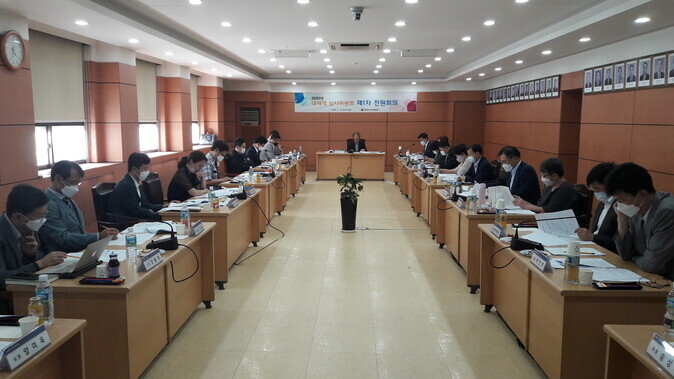hankyoreh
Links to other country sites 다른 나라 사이트 링크
S. Korea allows 35 conscientious objectors to service in alternative roles for 36 months

The South Korean Military Manpower Administration (MMA) has, for the first time, decided to allow 35 conscientious objectors to work in alternative roles to mandatory military service. An MMA press release published on July 15 stated that at the first general meeting of the Alternative Service Review Committee, 35 people who had been cleared of any wrongdoing by the Supreme Court for allegedly avoiding military service have been placed in “alternative roles.” This is the first time the agency has decided to place potential military recruits into alternative roles since the country’s National Assembly passed a revision to the Military Service Act in December of last year.
The conscientious objectors mentioned in the press release were all people who had applied for alternative service from June 30 to July 7. The law concerning the enlistment and service of alternative service members (the Alternative Service Act) stipulates that those found not guilty by the Supreme Court after being charged with avoiding military service will be placed in alternative service without a “fact-finding investigation” or a review by a “preliminary review committee.”
The 35 people selected for alternative service will be summoned as “alternative service personnel” from October of this year and conduct their service in correctional facilities managed by the Ministry of Justice for 36 months – twice as long as mandatory military service period. At the prisons, they distribute food and other items, help manage the health of inmates and sanitation in the facilities, and engage in other duties related to facility management.
The press release also announced that the alternative service review committee has put together guidelines to consider when reviewing alternative service applications. According to the press release, the committee is expected to review past Constitutional Court and Supreme Court cases, past cases from other countries, and listen to opinions from experts when deciding on alternative service applications. The guidelines when reviewing religious objection to military service includes eight different categories to be considered: how long the person has believed in a faith and whether they are involved in religious activities; how the faith discusses military service; why and how the person came to believe in the faith; and, whether other believers of that faith have refused to serve in the past.
Guidelines for reviewing objections to military service based on personal beliefs include the following eight categories for consideration: the specifics of those beliefs and how the person came into those beliefs; why and how the person came to form those beliefs; whether or not the person is involved in public activities related to those beliefs; and, whether their beliefs have been consistent.
By Park Byong-su, senior staff writer
Please direct comments or questions to [english@hani.co.kr]

Editorial・opinion
![[Column] Season 2 of special prosecutor probe may be coming to Korea soon [Column] Season 2 of special prosecutor probe may be coming to Korea soon](https://flexible.img.hani.co.kr/flexible/normal/500/300/imgdb/original/2024/0426/3317141030699447.jpg) [Column] Season 2 of special prosecutor probe may be coming to Korea soon
[Column] Season 2 of special prosecutor probe may be coming to Korea soon![[Column] Park Geun-hye déjà vu in Yoon Suk-yeol [Column] Park Geun-hye déjà vu in Yoon Suk-yeol](https://flexible.img.hani.co.kr/flexible/normal/500/300/imgdb/original/2024/0424/651713945113788.jpg) [Column] Park Geun-hye déjà vu in Yoon Suk-yeol
[Column] Park Geun-hye déjà vu in Yoon Suk-yeol- [Editorial] New weight of N. Korea’s nuclear threats makes dialogue all the more urgent
- [Guest essay] The real reason Korea’s new right wants to dub Rhee a founding father
- [Column] ‘Choson’: Is it time we start referring to N. Korea in its own terms?
- [Editorial] Japan’s rewriting of history with Korea has gone too far
- [Column] The president’s questionable capacity for dialogue
- [Column] Are chaebol firms just pizza pies for families to divvy up as they please?
- [Column] Has Korea, too, crossed the Rubicon on China?
- [Correspondent’s column] In Japan’s alliance with US, echoes of its past alliances with UK
Most viewed articles
- 1‘We must say no’: Seoul defense chief on Korean, USFK involvement in hypothetical Taiwan crisis
- 2After election rout, Yoon’s left with 3 choices for dealing with the opposition
- 3Why Kim Jong-un is scrapping the term ‘Day of the Sun’ and toning down fanfare for predecessors
- 4Noting shared ‘values,’ Korea hints at passport-free travel with Japan
- 5AI is catching up with humans at a ‘shocking’ rate
- 6[Editorial] Korea’s surprise Q1 growth requires objective assessment, not blind fanfare
- 7Two factors that’ll decide if Korea’s economy keeps on its upward trend
- 8Yoon says collective action by doctors ‘shakes foundations of liberty and rule of law’
- 9Amnesty notes ‘erosion’ of freedom of expression in Korea in annual human rights report
- 10South Korea a veritable tax break paradise for chaebol